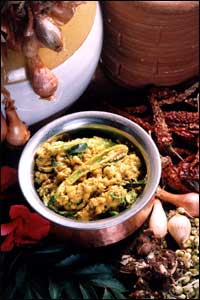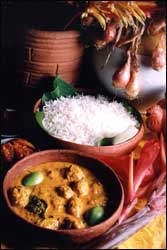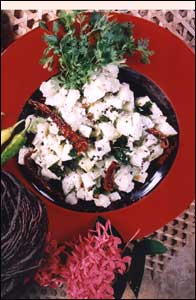Nag
Panchami is special to Vaishali and Parag Joshi's household in Vasco, a joint
family steeped in custom and gracious hospitality. Here, they share with us some
traditional recipes.
 Moonga Gaathi
Moonga Gaathi
(Bean
sprout preparation)
Serves:
Six
Time
required: 25 minutes plus preparation time
1/2
kg sprouted green grams (moong)
6
green chillies, slit lengthwise
1
coconut
marble-sized
ball of tamarind
1
tsp turmeric powder
1
tsp roasted coriander powder
salt
and jaggery to taste
oil
for seasoning
1
tsp mustard seeds
1/2
tsp asafoetida (hing)
7
to 8 curry leaves
In
a deep saucepan, cover the sprouted moong with sufficient water. Add the slit
green chillies and cook on medium heat till soft.
Grate
the coconut. Take the first and the second extraction from half the grated
coconut. Grind the other half with the tamarind and turmeric powder. Add this
ground coconut mix, along with coriander powder, salt and jaggery to the cooked
moong and bring to a boil. Add the coconut juice. Take off the heat and keep
aside.
In
a small vessel, heat a little oil. When hot, add the mustard seeds, asafoetida
and curry leaves and pour this into the moong. Mix well and serve hot.
Ambaddeachi
Uddamethi

(Hog plum curry)
Serves:
Six
Time
required: 20 minutes plus preparation time
4
- 5 ambades (hog plums)
2
cups grated coconut
4
peppercorns
1/4
tsp turmeric powder
1
tsp chilli powder
oil
1
tsp urad dal
1
tsp fenugreek (methi seeds)
5
to 6 curry leaves
1/4
tsp mustard seeds
a
pinch of asafoetida (hing)
lemon-sized
ball of jaggery
salt
to taste
Peel
the Ambaddes. Set aside.
Take
the first and second extraction of the coconut milk of one cup of the grated
coconut. Set aside. In a mixer, add the other cup of grated coconut, along with
the peppercorns, turmeric and chilli powders and grind to a fine paste.
Heat
a little oil in a small pan, and when hot, add the urad dal and fenugreek. When
brown, add the curry leaves, mustard seeds and asafoetida. When the seeds pop,
add a little water and the ambades. Add the jaggery and salt. Add the thin
coconut milk and cook. When done, add the ground coconut paste and bring it to a
boil. Add the thick coconut milk, stir and immediately remove from heat.
Serve
with rice.
Kakdichi Karam

(Cucumber salad)
Serves:
Six
Time
required: 15 minutes
2
cups cucumber pieces
2
green chillies, chopped
2
g tamarind
1/2
cup grated coconut
1/2
tsp roasted mustard seed powder
2
strings coriander leaves, chopped
salt
and jaggery to taste
Grind
together the green chillies, tamarind, grated coconut, mustard powder, coriander
leaves, salt and jaggery, along with a little water to form a fine paste. Mix
the paste into the cucumber pieces and serve immediately.
Pattolio
(Rice
flour sweet)
Serves:
Six
Time
required: 25 minutes
• 1/2
kg rice flour
• a
pinch of salt
• 1
coconut, freshly grated
• 1/2
cup jaggery
• 1
tsp cardamom powder
• 6
turmeric leaves
Soak
the rice flour in enough water to make into a soft paste. Add the salt. Set
aside. Add the jaggery and cardamon powder to the grated coconut. Mix well. Take
a turmeric leaf. Spread out some flour paste on it. Put a spoon full of coconut
filling in the centre. Turn over the flap and press to seal the edges. Repeat
the procedure for other pattolios.
Pressure
cook for 10-15 minutes and serve hot.
 Chana Dal Saar
Chana Dal Saar
(Chana
dal gravy)
Serves:
Six
Time
required: 20 minutes
2
cups chana dal stock (left over from the puran kadbu - recipe follows)
1
cup grated coconut
oil
1
tsp mustard seeds
1/2
tsp asafoetida (hing)
2
green chillies, finely chopped
10-12
curry leaves
salt
and jaggery to taste
Grind
the coconut and extract the first and second juice. Set aside. Heat the oil in a
pan and add the mustard seeds, asafoetida, green chillies and curry leaves.
Sauté. Add the chana dal stock, add the thin coconut milk, salt and
jaggery and bring it to a boil. Lower the heat and add the thick coconut milk.
Remove after one minute. Serve hot.
Puran
Kadbu
(A
sweet-stuffed savoury)

Serves: Six
Time
required: 30 minutes
For
the stuffing:
2
cups chana dal
2
cups jaggery
1/2
nutmeg, grated
1/2
tsp cardamom powder
For
the covering:
2
cups flour
2
tbsp oil
a
pinch of salt
To
prepare the stuffing
Add
four cups of water to the chana dal and cook till tender. Set aside. When cool,
drain the water completely. (Set aside this chana dal stock). Add the jaggery
and cook on low heat till it melts. Mix well with a big spoon and add nutmeg and
cardamom powder.
To
prepare the covering
Add
the oil to the flour. Mix well. Add a pinch of salt and make a hard dough.
Divide into 18 equal parts. Roll each into a square shape, put a little of the
stuffing mixture in the centre and seal from all four sides. This is the kadbu.
Grease a sieve, place the kadbus on it and steam for 12 to 15 minutes. Serve
piping hot with pure ghee.
Up
Close With The Naga
Since
vedic times, Nag Panchami (the snake festival) has been celebrated all over the
country on the fifth day of the Hindu month of 'Shravan' since Vedic times. On
this day, people, especially farmers, worship the cobra (Nag) as snakes play an
extremely important role in the protection of crops. Snakes eat rats and other
rodents, which usually infect the crops. On this day, women worship the cobra
and at places where there are no cobras, people make the offering to clay idols
of the snake.
Flashback:
Long ago, there was a farmer who killed some baby cobras when his plough
accidentally hit upon a snake hole. The mother snake was away and she was
furious at the sight that greeted her upon her return. To avenge her children's
death, the mother snake is believed to have killed the farmer's entire family.
However, the farmer had a daughter who was married and lived in another town
with her family. The mother snake then went to her home to kill her. Today, it
is a custom not to use any tools or implements on Nag Panchami.
The
Joshi Tradition
t
was in 1899, on the sixth day of 'Shravan' that the idol of Shree Damodar was
established in the Joshi household, which houses a temple in honour of the
deity. Shree Damodar, being the 'Gramdevata' (God of the town) of Vasco, the
entire town celebrates this foundation day every year. A 24-hour non-stop
'bhajan' festival is the highlight of the celebration along with a 'mela' on the
street. As a prelude to this festival, a Maharudra pooja is performed on
Nagpanchami day. About 30 to 40 Brahmins are invited to perform this ritual. The
household reverberates with the chanting of the Rudra.



